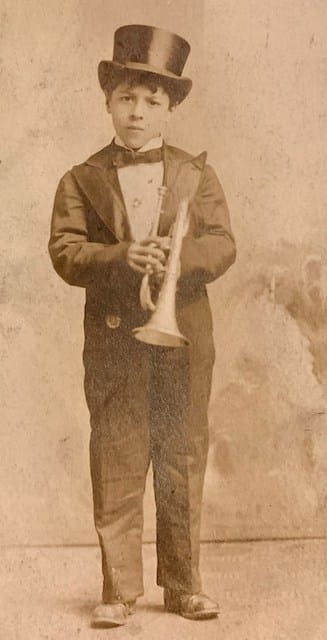Bibliography

Concerning the three “Kings of the cornet”—Bolden, Keppard, and Oliver—who defined early jazz in New Orleans, we are blessed with excellent histories of the first and third. In 1972, Donald M. Marquis published the first edition of his finely researched biography, In Search of Buddy Bolden: First Man of Jazz. Walter C. Allen and Brian Rust’s “King” Oliver (revised in 1987 by Laurie Wright), while more of a “discography/biography” than true biography, is nonetheless a wonderful resource in detailing Oliver’s life and career.
No such book exists for the second “King”, Freddie Keppard. At this late date, none probably will.
This seems a bit of a mystery given Keppard’s high status as horn player in the New Orleans jazz pantheon and the fact that his cornet style was a direct link to that of the legendary Buddy Bolden. Of all of the second generation cornet players, most old-timers thought that Keppard sounded most like Bolden. But that may be the problem. That style ended with Keppard. King Oliver would introduce a new, more blues-oriented style of playing that would be expanded upon by his protege, Louis Armstrong and Armstrong’s many followers, and become the sound that would come to define jazz.
That Keppard represents a dead end in a style of horn playing may partially explain the lack of interest in his life and career. Another reason that he is mostly forgotten today is probably that Keppard simply wasn’t a sympathetic figure, given his personality flaws and his excessive drinking. And a final reason is that he didn’t leave enough of a recorded legacy for 78 collectors and jazz historians to sink their teeth into.
What we are left with are a lot of “facts” about Freddie Keppard that few writers agree upon, and only a few facts that everyone agrees on. In between those are numerous myths that hold his story together.
One writer and historian who seriously researched Keppard’s life and music is the late Lawrence Gushee who wrote a detailed eight-page booklet for the Smithsonian’s 1979 record album of Keppard’s music, and the acclaimed book, Pioneers of Jazz: The Story of the Creole Band (2005), in which Keppard figures prominently.
More recently, Dan Vernhettes and Bo Lindstrōm profiled Freddie Keppard in a chapter of their excellent book, Jazz Puzzles, Vol. 1, providing much new information on Keppard and his times. It is, in effect, the only true biography of Keppard that has ever been done.
This article relies when possible on the research of Gushee and Vernhettes and Lindstrōm.
Books

Samuel Charters. A Trumpet Around the Corner (The Story of New Orleans Jazz). University Press of Mississippi. 2008.
John Chilton. Who’s Who of Jazz (Storyville to Swing Street). (Fourth Edition). Da Capo Press. 1985.


Pops Foster, with Tom Stoddard. The Autobiography of Pops Foster: New Orleans Jazz Man. Backbeat. 2005.
Lawrence Gushee. Pioneers of Jazz: The Story of the Creole Band. Oxford University Press. 2005.


Bill Russell (compiled and edited by Barry Martyn & Mike Hazeldine). New Orleans Style. Jazzology Press. 1994.
Brian Rust. Jazz and Ragtime Records 1897-1942. (Sixth Revised and Expanded Edition). Mainspring Press. 2002.


Dan Vernhettes with Bo Lindstrōm. Jazz Puzzles Vol. 1. Jazz Edit, Parigi. 2012.
Liner Notes
Larry Gushee. The Legendary Freddie Keppard, New Orleans Cornet. Smithsonian Institution (Produced in association with Columbia Records Special Products), 1979.


